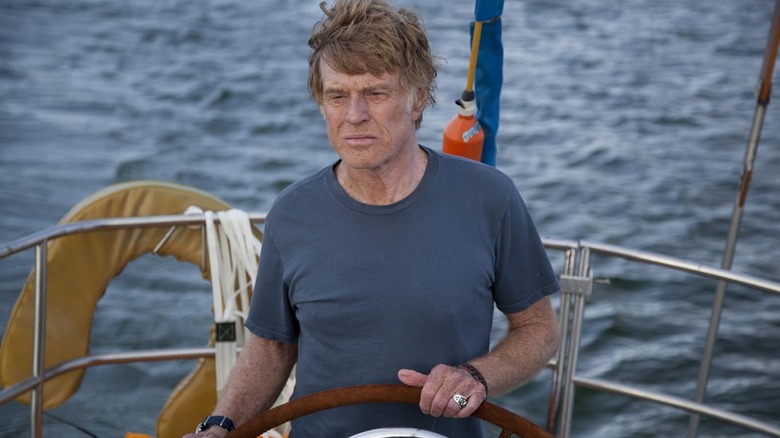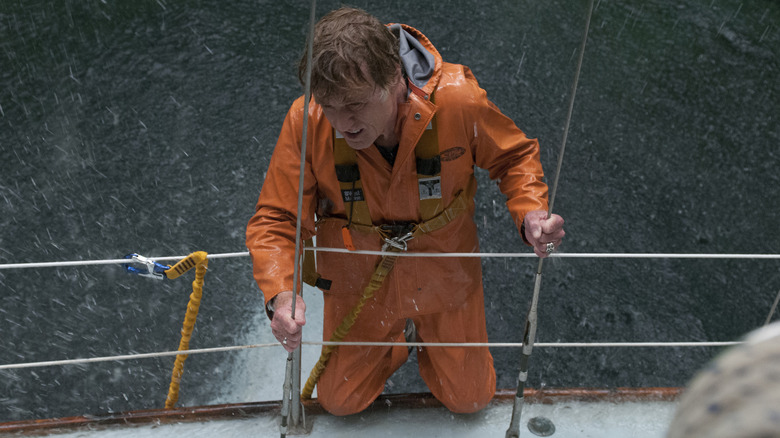Robert Redford Deserved An Oscar Nomination For This Film With Almost No Dialogue
The first time I saw "All Is Lost," I was underwhelmed. It was 2013, and although I admired the craftsmanship of writer/director J.C. Chandor's survival drama, the film didn't really resonate with me on a deeper emotional level. But perhaps that's not so surprising. It's not, to quote Vulture critic Alison Willmore, "an old man's movie, and I don't mean that as a criticism" in the manner of Spike Lee's "Highest 2 Lowest," a film that's all about legacy and examining what you've done with your life upon reaching a crossroads. It is, however, a story about finding yourself stuck in a mess of your own making and having to not only acknowledge that but to also recognize you might be screwed in a way you couldn't have imagined when you were younger.
Chandor is quick to establish this with the film's haunting opening. "13th of July, 4:50 pm. I'm sorry. I know that means little at this point, but I am," as Robert Redford's nameless old sailor explains in voiceover. His narration remains vague yet undeniably regretful as he continues from there, repeatedly emphasizing that he did his best and is sorry for what's happened but "all is lost here." Obviously, we as the audience have little idea just how dire his situation will become by the time he's driven to write this later in the film, but Redford's matter-of-fact remorseful tone speaks volumes. It's a monologue that might've come across as heavy-handed or show-y in the hands of a lesser actor but feels earnest and real as delivered by the late screen legend.
As moving as this prologue is, though, it's Redford's nearly wordless performance in the rest of the movie that truly impresses. That the Academy failed to reward his work with an Oscar nomination in what essentially amounts to a one-man show is all the more baffling in hindsight.
All Is Lost highlights Redford's physicality as an actor
There's a subtle art to playing characters of few words, and it's one that Redford excelled at, as evidenced by his turns in classic revisionist Westerns like "Butch Cassidy and the Sundance Kid" and "Jeremiah Johnson." (There's a reason the famous shot of Jeremiah gently smiling and nodding in approval has become one of the most popular reaction gifs ever in the age of the internet.) "All Is Lost" taps into that particular skillset by casting Redford as "Our Man," as the script dubs him, an older gentleman who awakens one day to find his boat is taking on water in the middle of the ocean after colliding with a displaced shipping container. With his communications system damaged and a storm approaching, "Our Man" is left with little choice but to roll his up sleeves and figure out a way to save himself.
Chandor's minimalist approach to the material is part of what makes "All Is Lost" so powerful. The fact that we never know, exactly, who "Our Man" is and the mistakes he made that led him to this place doesn't matter. Redford tells us everything we need to know about what's going on in his head with his expressions as he struggles to stay alive, culminating in him howling "F***!" at the heavens in what may be the most cathartic F-bomb ever put to the screen. That Redford was in his late 70s when he tackled such a physically strenuous and emotive role only makes this performance that much more impressive.
As for me, I revisited "All Is Lost" at a real emotional low point in my life some seven years after it opened in theaters. (I'll let you do the math.) Having found myself in a bad place and wrestling with my own feelings of regret and the sense that I could only really blame myself for my woes, I was surprised to find that the movie hit for me in a way that it simply didn't before. But that's the thing: Sometimes, you have to live a little for certain works of art to fully resonate with you. And if you're lucky, you may even stumble upon them again when you need them the most. For that, Chandor and the recently-departed Redford have my gratitude.

